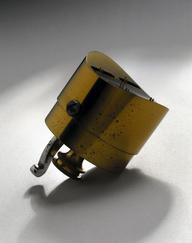

Pair of skiing type goggles, used as protective equipment by laboratory workers
- Made:
- circa 2014-15 in unknown place and Europe
Pair of skiing type goggles, used as protective equipment, for use by laboratory workers in the 'diagnostic tent' at the Manteneh Ebola Treatment Centre during the Ebola outbreak in Sierra Leone, 2014-2015
Healthcare workers in the diagnosis tents at the temporary Manteneh Ebola Treatment Centre in Sierra Leone, wore these ski googles as part of their Personal Protective Equipment (PPE). At the time, PPE, handwashing, disinfection, waste management and separating out people with Ebola were the only ways of protecting the surrounding communities and frontline workers. The virus is spread through contact with the body, blood, body fluids of someone with Ebola or the equipment used to treat and diagnose them. Confirmation of Ebola is through laboratory and blood tests.
Layers of PPE included face protection, goggles and mask or face shield, double gloves, gown or coverall, head cover and rubber boots. Each item was put in a buddy system and in sequence, known as donning, and removed, known as doffing. When in their PPE, frontline workers wrote their name and their role on their kit to help identify themselves. With the hot and humid conditions, frontline workers could only wear their kit for short periods of time, so they often added the time they put their last piece of PPE on.
Set up by the International Medical Corps the clinic in Makeni included frontline interactions with suspected or confirmed cases, the daily diagnostic procedures as samples were tested through to the administrative elements of certification and the role of health awareness materials.
The West African epidemic of Ebola that began in 2014 was the most widespread outbreak of the virus disease in history—causing major loss of life and disruption to society and the economy, mainly in the countries of Guinea, Liberia, and Sierra Leone. It became international news and prompted an international medical response. In June 2016 when Guinea was the last country to be declared free of Ebola, there were more than 28,000 cases and more than 11,000 deaths. Since 2021, a vaccine has been available to protect high-risk populations and frontline workers.




